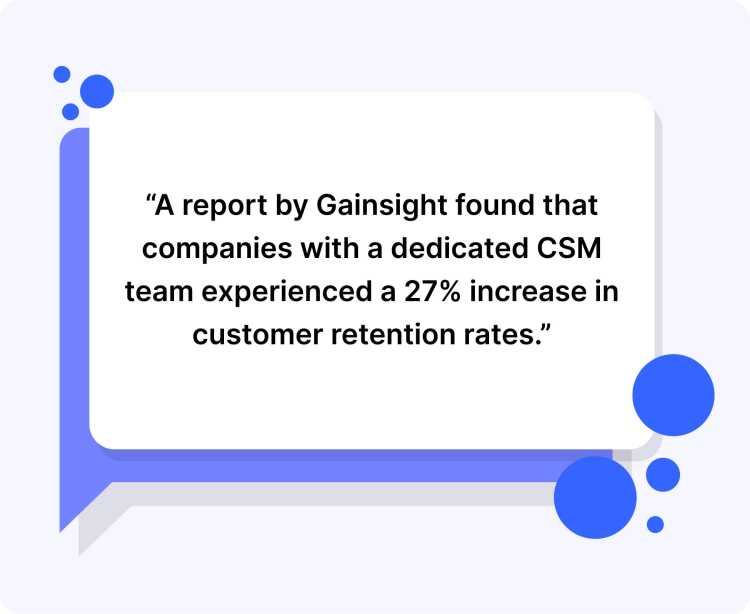A customer-centric approach is crucial for companies, regardless of their industry.
In today’s competitive marketplace, customers hold more power than ever in purchasing decisions, and it can be daunting to stand out in a noisy, crowded marketplace. That’s especially true because we now live in a subscription economy where the financial value of customers builds over time instead of being monetized upfront. Thus, providing an excellent customer experience is crucial to capitalizing on customer relations and retaining customers for a long time.
Companies must proactively engage customers, provide meaningful value from the first purchase, and offer more value throughout the customer journey. That’s where customer success managers come in handy.
Read on as we tell you who these are, what they do, and how you should hire them!
Who Is A Customer Success Manager?

A customer success manager (CSM) is the bridge between the company and its customers, ensuring that the latter derive maximum value from their purchased products or services. The customer success manager role is vital in any business that prioritizes customer satisfaction and long-term customer engagement.
The CSM aims to foster customer loyalty and build close, long-term client relationships. They are the customer’s advocate within the company, ensuring that the customer’s voice is heard and their needs are addressed.
But one thing is clear – a customer success specialist must communicate effectively with customers. So, they need the best tools to enhance communication, foster understanding, and expedite problem-solving. Zight, with its robust suite of features, is one such tool that can significantly empower customer success teams.
With Zight, your CMS can:
- Use the screen recording feature to create step-by-step video guides or tutorials for customers, simplifying complex processes or solutions. This enhances the customer’s understanding and saves time for both parties by reducing back-and-forth communication.
- Use the screenshot feature, coupled with annotation capabilities, to highlight specific areas or points in a document or on a webpage. This can be particularly useful when guiding a customer through a new feature or troubleshooting an issue.
- Use the webcam feature to record themselves answering customers’ questions. This will prove to customers that they are dealing with real humans, which could further boost trust, loyalty, and satisfaction.
- Create GIFs to demonstrate quick fixes or to show customers how to navigate certain features. These GIFs can be easily shared and replayed, providing customers with a handy reference.
Furthermore, your senior customer success manager can use Zight to train and onboard junior team members. Zight will help them collaborate with other colleagues to offer the best customer service.
What Does a Customer Success Manager Do?

A customer success manager plays a multifaceted role that revolves around ensuring customer satisfaction and fostering long-term customer relationships. Here are some of their key responsibilities:
- Customer onboarding: Customer success managers guide new customers through the initial stages of using a product or service. They provide training, answer questions, and ensure the customer understands how to get the most out of their purchase.
- Customer advocacy: Most customer success teams represent the customer’s voice within the company. By understanding the customer’s needs and challenges, CSMs can advocate for product improvements or new features to enhance the customer’s experience.
- Relationship building: A client success manager will cultivate strong customer relationships, establishing trust and rapport. They maintain regular contact with customers, providing updates and addressing any concerns.
- Problem-solving: Customer success managers work to proactively identify potential issues that could affect the customer’s experience and resolve them before they escalate. This might involve coordinating with other departments within the company, including technical support or product development.
- Customer retention and growth: This customer relationship manager works toward customer retention by ensuring customer satisfaction from the value of their purchase. They also identify opportunities for account growth – upselling or cross-selling additional products or services.
Top 6 Customer Success Manager Qualities
By now, you know the pivotal role a CSM could play for your team. But, your ideal customer success managers need to have good inherent traits that define their attitude and behavior.
The best qualities will shape how your customer success managers approach their role and interact with customers and colleagues. So, if you’re ready to hire, here are the qualities you should fill your CSM position with:
1. Working Well with a Team
A successful customer success manager must work well with a team. The ability to work well with a team is more critical than it seems.
A manager who can’t work well with a team wastes even an excellent client success team. Managers must work well with the customer success team and other departments, such as customer support, marketing, and sales. That’s because communication is crucial for effectively managing your customer success.
It’s also a bonus for managers to have excellent leadership skills. Leadership skills play a crucial role when the team encounters challenges. That’s when a team needs a leader who can guide and motivate them to get things done.
The following interview questions can help you hire the right candidate include:
- Tell me about a time when you helped a team member.
- Describe a time when your team faced an obstacle that was difficult to solve. How did you keep your team motivated? How did you guide your team to overcome the obstacle and succeed?
2. Keeping the Customer at the Forefront
Just like any other customer service role, the customer must always come first. Thus, your ideal customer success manager must always put the customer at the forefront of their attention. That’s because a customer’s success equals a customer success manager’s success. The more a customer success manager can invest in a customer’s needs and goals, the more they’ll succeed in their position.
Customer success isn’t a department; it’s a mindset for your entire team. Thus, when looking for a top-performing customer success manager, look for candidates that have a customer-first perspective to their job.
A good candidate should develop solutions with the customer’s needs in mind. Further, when hiring a customer success manager, look for candidates that will show empathy towards your customers throughout the customer journey.
The following questions can help you hire the right customer success manager include:
- Tell me about a time a client criticized your product. How did you handle the criticism? (Here, look for signs of empathy and whether the candidate is open to accepting criticism).
3. Problem-Solving and Strategic Mindset
A problem-solving and strategic mindset will enable a customer success manager to develop a solution from a pile of disconnected and complex data. This will help them develop a customer success strategy backed by solid data. Also, this helps the customer success manager troubleshoot problems proactively and construct a roadmap of viable changes based on customers’ needs and goals.
A solid strategy is essential in convincing the stakeholders concerning new concepts, such as leveraging customer success software to improve customer retention and reduce churn rate. Customer success managers with a strategic and problem-solving mindset can easily identify areas of weakness and opportunities to increase their market share. This helps them put forward their strategy compellingly and concretely.
The following questions can help you hire the right customer success manager with excellent problem-solving skills:
- What strategy will you leverage to manage a mix of customer accounts?
- Our competitors have just released a new feature, which our brand doesn’t have yet, and our customers are asking for the new feature. What will you do?
4. Ambition and Growth Mindedness
Jay Nathan notes that, “No matter what roles I’m hiring for on my teams I look for three qualities: you have to be humble, hungry, and smart. These characteristics translate into someone who is authentic, growth-minded, and good with people.”
When filling the customer success manager position, it’s essential to distinguish between a person’s mindset and their skill sets. Mindsets are natural beliefs, attitudes, and perspectives that one carries with them independent of the environment.
And skill sets are a combination of soft or hard skills, which a person has developed over time. For example, one mindset you should emphasize when hiring a customer success manager is relentless ambition. Relentless ambition is a growth mindset.
A candidate with relentless ambition and a growth mindset always strives for excellence despite obstacles; is resilient, and frequently seeks feedback. Thus, a good customer success manager must reckon that there’s something to learn from pushing through difficult situations because there’s always growth and results on the other side of the obstacle.
The following questions can help you hire a candidate with a growth mindset:
- What keeps you motivated?
- What does customer success look like to you?
- Tell me a time when you set a stretching goal, and how you achieved it.
- Where do you want to be in the next five years, and how will you get there?
5. Empathy
Empathy is a less-mentioned soft skill that plays a significant role in the success of a customer success manager. Empathy is a person’s ability to understand another person’s situation by imagining themselves in that person’s position.
Empathy is critical in establishing where your customer service falls short or the part that confuses your customers. It identifies the anatomy of an excellent customer experience.
Let’s say a customer is experiencing problems using a certain feature and submits a complaint. If a customer success manager can step into the client’s shoes and assess the situation, then they may relate to the problem and help the client or direct the changes needed. Identifying problems and correcting them becomes easy if a customer success manager can view the problem from a customer’s point of view.
- If a customer experiences problems using specific features, then what’s the issue at hand? Support, product, training, the client success team, or the customer?
6. Time Management
Excellent time management skills enable a customer success manager to work more productively. Also, this means that a customer success manager is effectively using the available resources, including time. A customer success manager will handle tons of data and metrics. A manager must derive conclusions to identify where changes are needed. Each key metric requires a customer success manager to have excellent time management and organization skills.
A customer success manager must use time effectively to keep customers satisfied and manage the customer success team. This can only happen through proper time management.
- How will you manage your time to onboard new clients, keep existing clients, grow the company’s portfolio, and improve customer advocacy?
- You have a day full of pre-planned onboarding meetings. How will you facilitate an escalation from your key customers?
Tons of managers use Zight to offer better customer service. Drift’s customer success team uses Zight to save 56 hours weekly. Zighthelps managers create shareable visuals with only a few clicks.
Top 10 Customer Success Manager Skills
While you want to be particular about the qualities of your CSM, you also want to pay huge attention to their skills. Customer success manager skills are typically learned abilities or industry knowledge developed through training and experience. They are often tangible and measurable.
Here are some skills you should look for when hiring customer success managers:
1. Technical Knowledge
When hiring a CSM, you know they’ll be monumental in ensuring customer success and satisfaction. So, they have to possess the best technical knowledge of what your business offers. Technical knowledge allows the CSM to assist customers effectively, answer their queries accurately, and provide solutions to their problems swiftly.
For instance, if you’re a software company, your CSM should understand how your software works, its features, and its potential issues. This knowledge enables them to guide customers through the software, explain its features in a user-friendly manner, and troubleshoot any issues that arise.
2. Analytical Skills
Analytical skills are crucial for a client success manager job description. This is because a CSM’s role involves a lot of customer data. They analyze customer usage data, feedback, satisfaction metrics, and more. This analysis helps them understand customer behavior, identify trends, and spot opportunities for improvement. Finally, they will turn the data into actionable insights.
Imagine your CSM noticing a drop in usage among a segment of your active users. With their analytical skills, they could dig into the data, identify the cause of the drop, and develop a strategy to address it. This could involve reaching out to these customers, understanding their challenges, and offering solutions.
3. Negotiation Skills
Customer success managers often find themselves in situations where they need to reach a mutually beneficial agreement with a customer. This could be about contract renewals, service levels, or resolving disputes.
Suppose a customer is considering not renewing their contract due to budget constraints. In this case, your customer success manager with strong negotiation skills could work with the customer to find a solution that meets their budget without compromising the value they get from your product or service. They could offer a customized package or a discount for a longer-term contract.
4. Strong Leadership Skills
Customer success management is not a one-man’s job – it will comprise different teams in your company that all work in tandem to ensure customer satisfaction. So, customer success managers should be able to lead cross-functional teams to resolve customer issues or implement customer success strategies. They need to inspire, motivate, and coordinate team members to ensure customer success.
For example, your CSM will lead the resolution process if a customer encounters a complex issue involving the technical and product teams. They would coordinate between the teams, ensure everyone is on the same page, and keep the customer updated throughout the process.
5. Project Management Skills
Regardless of what your business offers, it is possible you will have different projects- so get a CSM with impeccable management skills to satisfy customers. Most customer success managers handle multiple customer-related projects simultaneously, from onboarding new customers to implementing customer success initiatives.
6. Conflict Resolution Skills
In their role, customer success managers encounter situations where a customer is unhappy, or there’s a disagreement over a particular issue.
For example, a customer might be dissatisfied with a feature of your product. A CSM with strong conflict resolution skills would handle this situation delicately. They would listen to the customer’s concerns, empathize with their frustration, and work toward a solution that addresses the customer’s issue while aligning with your company’s capabilities.
7. Sales Skills
While a customer success manager’s primary role isn’t sales, they often need to identify and seize upselling or cross-selling opportunities.
Imagine a case where a customer is using one of your products and is unaware of another product that could further enhance their experience. A customer success manager with good sales skills will identify this opportunity, explain the benefits of the additional product to the customer, and potentially make an additional sale.
8. Training Skills
Customer success managers work with your customers to help them succeed with your products and services. Since the CSM is the bridge between your offer and the customer, they need to be able to train your customers if a problem ever arises. A significant part of a CSM’s role involves educating customers about your product’s features and how to use them effectively.
For example, when a new feature is launched, your CSM would be responsible for ensuring that customers understand how to use it and how it can benefit them. This might involve creating tutorial videos, writing user guides, or conducting webinars.
9. Good Networking Skills
A customer success manager needs to build and maintain professional relationships with customers and colleagues, industry professionals, and other stakeholders.
For instance, your CSM might attend industry events or webinars where they can meet potential customers or learn about new trends in your industry. They could also build relationships with other teams within your company to understand their processes and challenges better.
10. Digital Skills/ Literacy
In today’s digital age, customer service managers must be comfortable navigating and utilizing various digital tools and platforms, whether customer relationship management (CRM) systems, communication tools, or data analysis software. They will often use the CRM tools your business uses to rack customer interactions; a video conferencing tool to conduct virtual meetings with customers; or a data analysis tool to analyze customer usage data.
Customer Success Manager Salary

The salary range for a customer success manager can vary significantly depending on factors like the size of the company, the industry, the location, and the individual’s level of experience or education. According to Payscale, the salary range for customer success managers typically falls between $52,000 and $125,000 per year in the United States.












